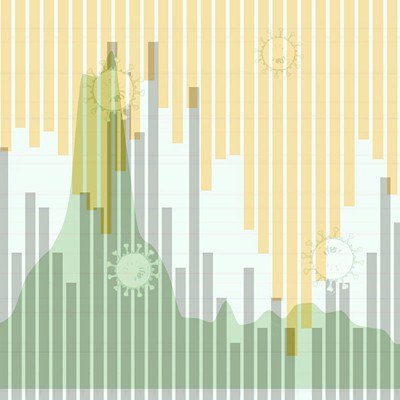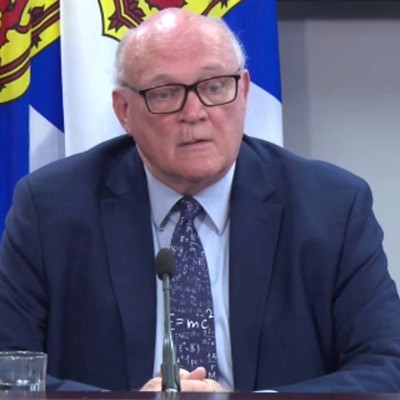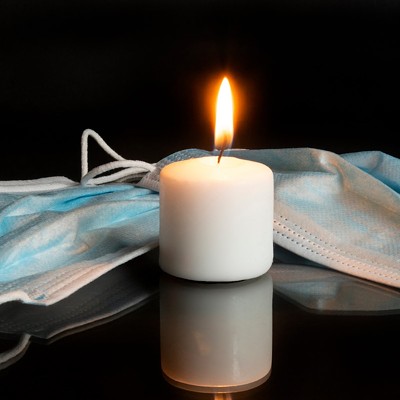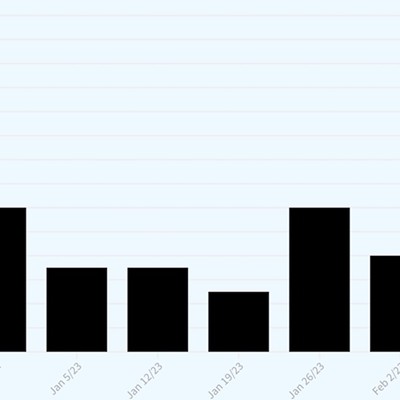How to test yourself for COVID-19
As 811 gets flooded with calls, premier unviels a "self-diagnostic tool" to find out if you should be concerned.
[
{
"name": "Air - Inline Content - Upper",
"component": "26908817",
"insertPoint": "1/4",
"requiredCountToDisplay": "8"
},{
"name": "Air - Inline Content - Middle",
"component": "26908818",
"insertPoint": "1/2",
"requiredCountToDisplay": "8"
},{
"name": "Air - Inline Content - Lower",
"component": "26908819",
"insertPoint": "100",
"requiredCountToDisplay": "1"
}
]
At this morning's press conference on Nova Scotia's coronavirus preparations, premier Stephen McNeil and Robert Strang—the provincial chief medical officer of health—talked about the 811 phone line. The 811 system takes pressure off hospitals by letting citizens connect with a registered nurse from the comfort of their phones. But the volume of calls about COVID-19 concerns is putting pressure on 811.
"A plea to Nova Scotians: If you're looking just for information around covid disease, we have a website," Strang said.
Besides doubling 811's phone capacity, McNeil said the 811 site now has a "self-diagnostic tool" to let people figure out for themselves if they really need to talk with an 811 nurse: "I do want to make sure those Nova Scotians that can access the website, do so and use the self-diagnostic tool that is there."
Strang said the "self-assessment tool" went live in the last couple of days. We went to the site to try it out, and discovered that calling it a "tool" sets expectations awfully high for what boils down to asking yourself four questions, some of which you can't answer definitively.
But maybe what would better be described as screening questions will help re-assure some people that their cough probably isn't COVID-related. So here are the four questions to find out if you might have the illness.
1) Have you travelled outside of Canada in the last two weeks? (You should definitely be able to answer this with a yes or no.)
2) Have you been within two meters of someone with a confirmed case of COVID-19 in the last two weeks? (At this point of heightened pandemic awareness, you'd have to make an effort to be near someone who already had a confirmed case. But what if you bumped into someone 10 days ago who got a confirmed diagnosis yesterday? Unless that person was a high-profile infectee like Tom Hanks or Sophie Grégoire Trudeau, how would you know to answer yes?)
3) In the last two weeks, have you been in close contact with someone who has travelled outside of Canada within the past 14 days who has a cough and/or a fever of higher than 38 C? (If you know the recent travel and medical history of everyone you've shared airspace with lately, feel free to answer yes or no. The rest of us are stuck with a solid "maybe.")
4) Do you have a fever higher than 38 C or a new cough? (This one's important!)
If you answer yes to any of 1, 2 or 3, and also a yes to 4, go ahead and call 811.
If you answer yes to 1, but no to 4:
If you are a civil servant, public sector employee, health-care work, teacher, public-school student or child in daycare, according to new measures announced today "you are required to stay at home and self-isolate for 14 days after your return to the country." If you develop a fever or cough during your isolation, call 811.
If you were in Italy, Iran or China's Hubei province, you also need to go into self-isolation for two weeks. Call 811 if you develop fever or cough.
Yes to 2 or 3, but no to 4, means you can carry on as normal but need to pay attention to your health and call 811 if you develop fever or cough.
No to 1, 2, 3 and 4 means you shouldn't call 811 about coronavirus and don't need to go into self-quarantine. When your situation changes, use the tool again.
———
Come back here or check with NS public health for the latest reliable updates. In the meantime, wash your hands, cover your cough, wipe commonly used surfaces and stay home if you feel sick.
"A plea to Nova Scotians: If you're looking just for information around covid disease, we have a website," Strang said.
Besides doubling 811's phone capacity, McNeil said the 811 site now has a "self-diagnostic tool" to let people figure out for themselves if they really need to talk with an 811 nurse: "I do want to make sure those Nova Scotians that can access the website, do so and use the self-diagnostic tool that is there."
Strang said the "self-assessment tool" went live in the last couple of days. We went to the site to try it out, and discovered that calling it a "tool" sets expectations awfully high for what boils down to asking yourself four questions, some of which you can't answer definitively.
But maybe what would better be described as screening questions will help re-assure some people that their cough probably isn't COVID-related. So here are the four questions to find out if you might have the illness.
1) Have you travelled outside of Canada in the last two weeks? (You should definitely be able to answer this with a yes or no.)
2) Have you been within two meters of someone with a confirmed case of COVID-19 in the last two weeks? (At this point of heightened pandemic awareness, you'd have to make an effort to be near someone who already had a confirmed case. But what if you bumped into someone 10 days ago who got a confirmed diagnosis yesterday? Unless that person was a high-profile infectee like Tom Hanks or Sophie Grégoire Trudeau, how would you know to answer yes?)
3) In the last two weeks, have you been in close contact with someone who has travelled outside of Canada within the past 14 days who has a cough and/or a fever of higher than 38 C? (If you know the recent travel and medical history of everyone you've shared airspace with lately, feel free to answer yes or no. The rest of us are stuck with a solid "maybe.")
4) Do you have a fever higher than 38 C or a new cough? (This one's important!)
If you answer yes to any of 1, 2 or 3, and also a yes to 4, go ahead and call 811.
If you answer yes to 1, but no to 4:
If you are a civil servant, public sector employee, health-care work, teacher, public-school student or child in daycare, according to new measures announced today "you are required to stay at home and self-isolate for 14 days after your return to the country." If you develop a fever or cough during your isolation, call 811.
If you were in Italy, Iran or China's Hubei province, you also need to go into self-isolation for two weeks. Call 811 if you develop fever or cough.
Yes to 2 or 3, but no to 4, means you can carry on as normal but need to pay attention to your health and call 811 if you develop fever or cough.
No to 1, 2, 3 and 4 means you shouldn't call 811 about coronavirus and don't need to go into self-quarantine. When your situation changes, use the tool again.
———
Come back here or check with NS public health for the latest reliable updates. In the meantime, wash your hands, cover your cough, wipe commonly used surfaces and stay home if you feel sick.

















